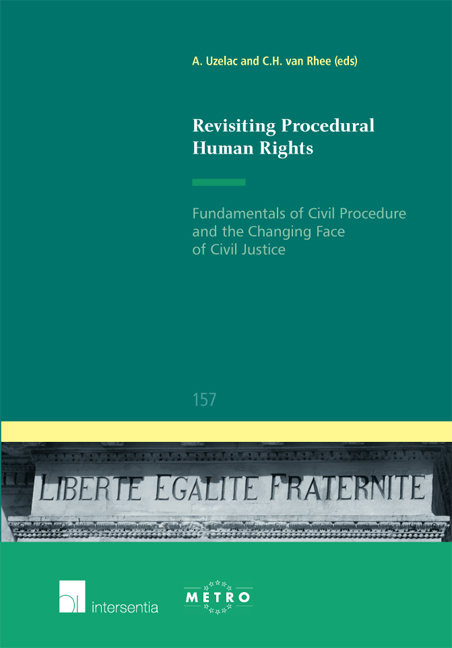 Revisiting Procedural Human Rights
Revisiting Procedural Human Rights Book contents
- Frontmatter
- Table of Contents
- List of Authors
- List of Abbreviations
- Acknowledgements
- Introduction
- The Human Right to Accessible and Foreseeable Justice
- Fundamental Procedural Rights from a National Angle
- Wheels of History: Fair Trial Rights in Historical Perspective
- Access to Justice by Means of Arbitration in Roman Law
- Civil Procedural Aspects of Retroactivity – Historical and Comparative Perspectives
- Equal Justice for all: Empirical and Normative Approaches to Legal Aid and Assistance in Civil and Administrative Cases
- Ius Commune Europaeum
Civil Procedural Aspects of Retroactivity – Historical and Comparative Perspectives
from Wheels of History: Fair Trial Rights in Historical Perspective
Published online by Cambridge University Press: 13 October 2018
- Frontmatter
- Table of Contents
- List of Authors
- List of Abbreviations
- Acknowledgements
- Introduction
- The Human Right to Accessible and Foreseeable Justice
- Fundamental Procedural Rights from a National Angle
- Wheels of History: Fair Trial Rights in Historical Perspective
- Access to Justice by Means of Arbitration in Roman Law
- Civil Procedural Aspects of Retroactivity – Historical and Comparative Perspectives
- Equal Justice for all: Empirical and Normative Approaches to Legal Aid and Assistance in Civil and Administrative Cases
- Ius Commune Europaeum
Summary
Introduction
In times of emergencies and crises political considerations tend to prevail over those that are strictly legal. Political ideas are transformed into rules without too much concern for ‘technicalities’. New laws are drafted and old ones amended according to the needs of the moment in an effort to achieve certain political, social or economic results as soon as possible. In this process, with the focus on the main goal of a project, transitory provisions can represent a specific challenge. Although they are not part of the core subject matter regulated by legislative act, and thus often treated as not so important, their less than careful preparation can create many problems in the application of a law. The primary reason for this is the temporal aspect of transitory provisions which becomes even more significant in times of fast-paced changes.
Transitory rules, in general, or intertemporal rules, more specifically with respect to the subject matter of conflict of laws in time, regulate the temporal succession of laws. In essence, they give the date when one act will cease to be applied and a new one will come into force. Although this does not seem to be such a problem at first glance, different variations in temporal arrangements of new legislation can cause confusion and problems in the aftermath of its enactment. The lesser issue is the application of various provisions of the same act from different dates resulting in the simultaneous partial use of old and new law. This is primarily a practical problem whose gravity depends on the number and significance of the rules with postponed entry into force, and one that can be more easily remedied, e.g. by timely instruction of judges. The greater problem, especially from the strictly legal standpoint, can be a retroactive effect given to provisions which are going to be applied in the future.
In principle, retrospective regulation is not admissible. It is deemed contrary to the rule of law, one of the main tenets of modern democracies. Retroactivity negates legal certainty as one of the prerequisites for the normal operation of a legal system and practically defeats the purpose of law as a system of norms aimed at regulating life in the community. Thus, in many countries, in constitutional provisions or acts with similar importance, the general retroactive application of laws is prohibited.
- Type
- Chapter
- Information
- Revisiting Procedural Human RightsFundamentals of Civil Procedure and the Changing Face of Civil Justice, pp. 263 - 284Publisher: IntersentiaPrint publication year: 2017


